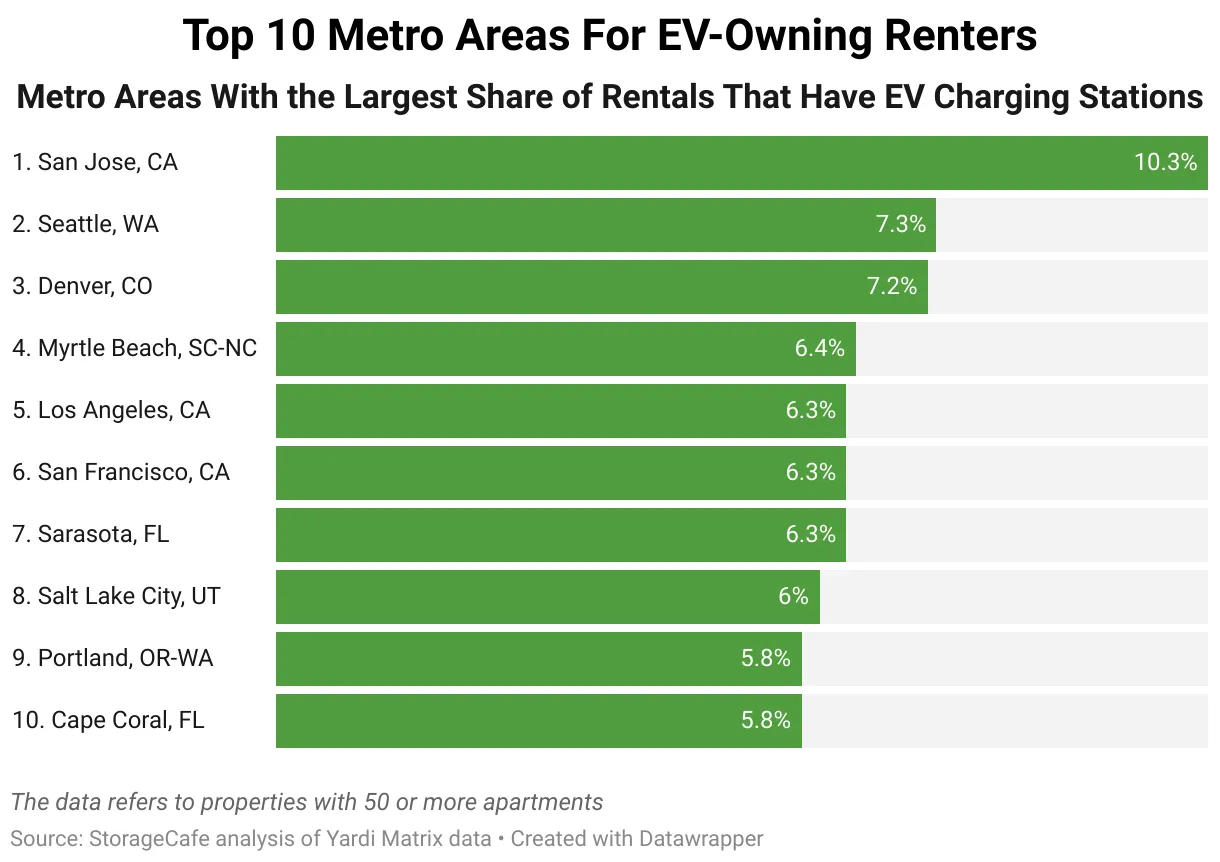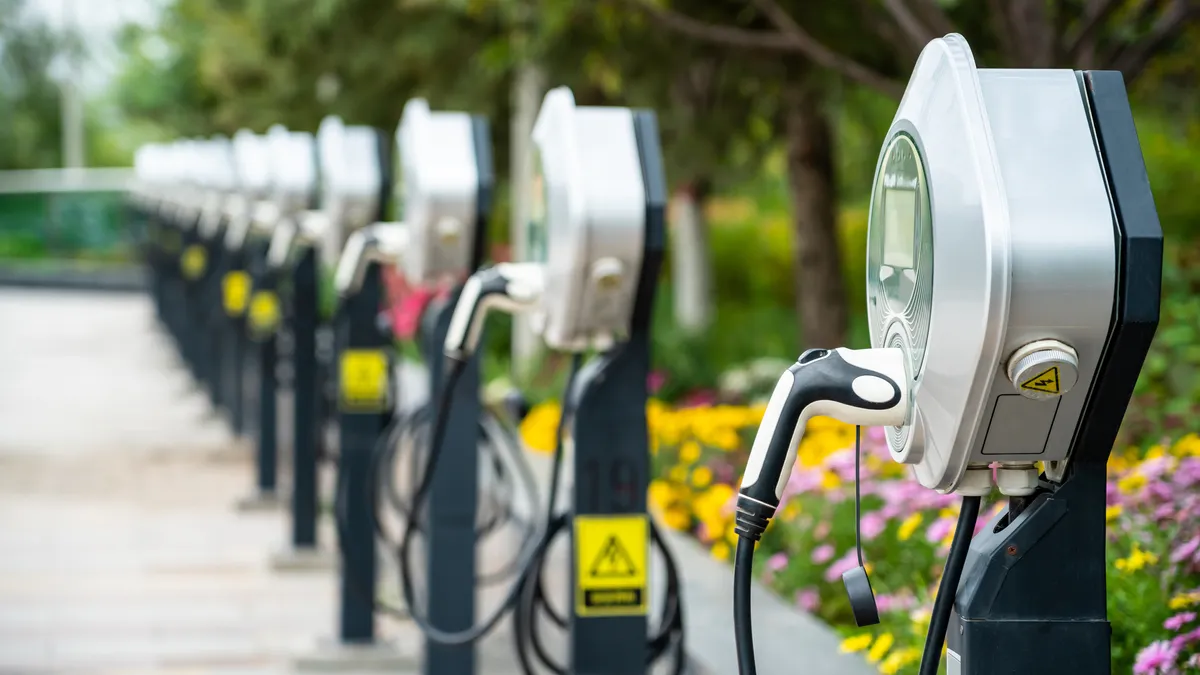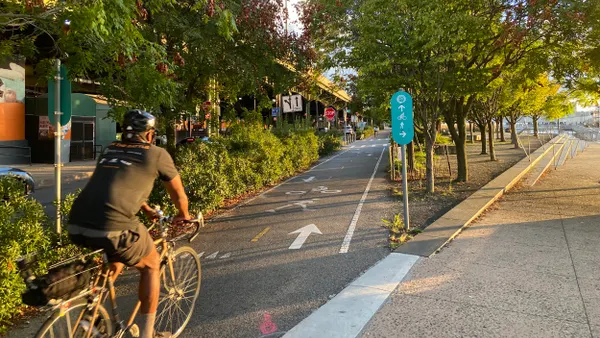Dive Brief:
- Electric vehicle sales are ramping up, with 800,000 of them sold last year alone — an increase of 65% from 2021, according to a new report by StorageCafe ranking the nation’s largest metros by their electric vehicle infrastructure.
- California has had the most electric vehicle adoption by far, up from 258,000 vehicles in 2016 to 878,000 in 2021. On a city level, Los Angeles has the most registered EVs at 290,000, while Jackson, Mississippi, has the least at 480.
- However, the availability of EV charging infrastructure varies widely depending on geographic location. Out of the top 10 U.S. metros for electric-vehicle friendliness, California metros make up more than half of the spots — while Miami is the only Southern or East Coast city in the top 10.
Dive Insight:
In a 2022 National Multifamily Housing Council survey, 27% of renters said they were interested in EV charging stations, and respondents said they would pay $28.12 more per month for them. At the same time, on top of state level rebates and incentives, the Inflation Reduction Act, passed by Congress earlier this year, reinstated a tax credit of up to 30% of the cost for chargers nationwide.
As of now, about 4.7% of multifamily residential buildings nationwide offer EV charging stations as an amenity to residents, according to data shared with Multifamily Dive by StorageCafe. At the metro level, San Jose has the highest concentration of residential buildings with EV chargers — 10.3% of the total number of rentals, according to Yardi Matrix data from the StorageCafe report. Seattle’s 7.3% concentration gives it the second-highest share of rentals with EVs.

StorageCafe ranked each metro by the concentration of residential and public chargers as well as the number of EVs on the road, the cost of electricity and local incentives.
Based on these factors, the report found Seattle to be the top metro for electric vehicle friendliness overall. The city has over 47,000 EVs on its roads, approximately 0.6 public charging stations per 1,000 households and charging stations available at 7.3% of its rental properties.
San Francisco came in second, with over 105,000 registered EVs — roughly 5% of the national total — 1.4 charging stations per 1,000 households and stations available at 6% of rental properties. San Jose ranks third with 44,000 EVs registered locally, 2.2 charging stations per 1,000 households and stations available at 10% of rental properties.
The top 10 most EV-friendly metros
| Metro | EVs registered as of 2021 | EV public charging stations per 1,000 households | Share of rental buildings with EV charging stations | Prce per “eGallon” | |
|---|---|---|---|---|---|
| 1 | Seattle | 47,518 | 0.6 | 7.3% | $0.90 |
| 2 | San Francisco | 105,496 | 1.4 | 6.3% | $2.20 |
| 3 | San Jose, California | 44,447 | 2.2 | 10.3% | $1.20 |
| 4 | Portland, Oregon | 28,345 | 0.5 | 5.8% | $1.00 |
| 5 | San Diego | 73,259 | 1.0 | 4.8% | $1.90 |
| 6 | Sacramento, California | 53,231 | 0.8 | 2.1% | $1.40 |
| 7 | Los Angeles | 293,298 | 1.1 | 6.3% | $2.40 |
| 8 | Miami | 36,423 | 0.4 | 4.6% | $0.90 |
| 9 | Riverside, California | 102,158 | 0.6 | 2.2% | $1.60 |
| 10 | Stockton, California | 17,304 | 0.4 | 4.4% | $1.60 |
SOURCE: StorageCafe
Charging station numbers rose by 58% in 2021 compared to 2020, according to the U.S. Department of Energy’s Alternative Fuels Data Center. Still, one of the biggest obstacles to electric vehicle adoption is the inconsistent charging infrastructure.
As of now, while the top metros for EV concentration have 0.6 or more public EV charging stations per 1,000 households, nearly half of U.S. metros with 500,000 or more residents have 0.2 or fewer public EV charging stations per 1,000 households. One metro, McAllen-Edinburgh-Mission, Texas, has no public EV charging stations at all, and 17 metros do not have any rental properties with EV charging stations available.












